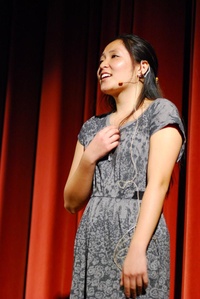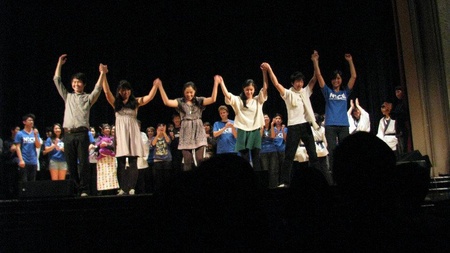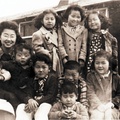The person I am today is not necessarily who I will be tomorrow. With each new experience I gain, each lesson I learn, I am constantly growing and evolving, redefining my identity in this world. But the person I have become is deeply defined by my roots.
These are the roots that my great great grandparents planted in American soil when they immigrated from Japan that have dug deeper with each new generation, Issei, Nisei, Sansei, Yonsei, and Gosei. Unyielding, they have lived through seasons of change: sweet summers of agricultural and entrepreneurial success to tormenting winters of racism and incarceration. Even when society has tried to uproot and cut off their civil liberties, scarred and bruised, they remain intact, even stronger than before.
From these roots, I have blossomed, supported by the foundation of my Japanese American heritage and community.
What does being Japanese American mean to me? Well, the first thing that always pops into my mind is a strong community followed by rich culture and a history of struggle, triumph and urgency. But you can’t leave out the amiable rivalries and lifelong friendships formed from JA basketball league, bonding over the fact that spam musubi, yet so simple, never fails to hit the spot, and anxiously waiting all year for summer when I get the chance to break out my moves when I hear Shiawase Samba blasting on the speakers. It’s actually a really difficult question to answer.
Maybe it’s knowing that this is who I am and where I came from and finding comfort and confidence in the fact that my identity is not something that anyone can take away from me. It’s something that I can be proud of. Japanese American is its own unique culture, uniquely me.
I wish I could, but the fact is, I can’t speak Japanese. Far removed by many generations here in America, I feel a very distant connection to Japan. But this connection is to the Japan of the late 1800s and early 1900s that my great great grandparents knew and whose traditions they brought with them, rather than the drastically different present day Japan that I hardly know anything about.
I recently learned that folding 1000 cranes for a wedding, what I had always thought was a Japanese tradition, is actually not celebrated in Japan at all. It’s a JA thing. This reminds me of all the times I’ve corrected my friends when they said “you-dan” instead of udon or “kereoki” instead of karaoke. But then I realize that I’m not even saying it the correct way. I’m saying it in Japanese, but most likely with a bad American accent.
From moving to Berkeley from a very large JA community in the Torrance and Gardena area in the South Bay of LA and experiencing a totally different Japanese American community, I’ve come to realize not all Japanese American communities are the same, contrary to what I had first assumed. What I perceive to be Japanese American may not be what a person from the Bay Area or Hawaii or a Shin-Nisei thinks is Japanese American.
The greater Japanese American community has become increasingly diverse over the years and has evolved to include the more established, older communities, the Sansei and Yonsei, as well as the more recent Japanese immigrant communities, the Shin-Issei and Shin-Nisei, the hapa communities, and various people who have found their niche in the JA community. Through these differences in identity and background, I’ve found a divide in the cohesiveness between these aspects of the JA community. I feel like this is something that isn’t addressed enough, but extremely important to the future of our community.
However, I still feel very connected with these people although we come from very different backgrounds. What unites us may not be tangible things such as anime and J-pop or basketball and spam musubi, but more abstract cultural values and morals that have been instilled in us and passed down from generation to generation. I’m talking about kachikan, these values that guide our behavior, thoughts, and actions. Respect, ganbatte, enryo…Japanese values that I cannot even find the words to describe in English. From these similarities and commonalities, there arises a community.
Through my experiences, I have learned that a community is more than a group of people that may share a common interest or common goal. A community is a network of support that is much bigger than a family. It is a place where you can feel at home in the midst of confusion and change, a place where you can discover more about yourself, define your identity, and realize the selflessness and capacity of the hearts of amazing, ordinary people. I’ve found so much inspiration in the Japanese American community through the hard work and unwavering dedication that I have witnessed to keep it alive.
A tree cannot survive without its roots. This Japanese American community cannot survive without its rich history and the support of its members. Life is all about discovering the unknown, connecting with those around you, and relating to the common struggles and joys of people who you may not first expect. I hope you take the time to appreciate what communities you may be a part of and how much you have learned from them, but most importantly, how you can contribute to their future.
© 2012 Maya Kochiyama







